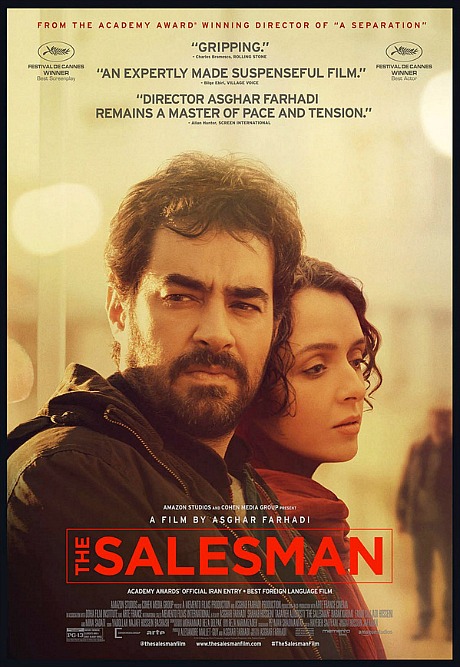We all have a basic instinct in our genes to show obeisance before power. Once the big gorilla has beaten his chest with sufficient fervor and shown territorial dominance, something deep-rooted compels lesser primates to go “hoo, hoo, hoo, hoo, hoo” and bow down when he passes. I for one have always resisted this for the most part. Bill Maher exhibited no monkey submission last night, and neither did John Legend when he came on the show at the halfway mark. Sad to say, Oprah Winfrey did the other day. “To hear President Obama say that he has renewed confidence in the peaceful transition, I think everybody can take a deep breath,” she said. “Hope is still alive.” Oprah has always been a kowtower. Thankfully tens of millions of others are made of sterner stuff.
Daily
At Last, Farhadi’s Salesman On U.S. Shores
From “Things Not Said,” posted during Cannes Film Festival on 5.21.16: “Emad, a 30something Tehran school teacher (Shahab Hosseini), is playing Willy Loman in a stage production of Arthur Miller‘s Death of a Salesman, and his wife Rana (Taraneh Alidoosti) is playing Linda, Willy’s wife. An intriguing endeavor but the play, we soon learn, isn’t central to their story.
“Forced by structural problems to vacate their apartment building, the couple has moved into another place, a bit raggedy but reasonably spacious, that a friend has referred them to. The wrinkle is that it was recently vacated by a prostitute or, as locals describe her, ‘a woman with many male companions.’ But things are otherwise okay. Emad and Rana are happy (they’re thinking about having a child), Emad enjoys his teaching job, the play is selling tickets, etc.

“One day while Emad is out and Rana is about to take a shower, the front-door alarm sounds and Rana, presuming it’s Emad, pushes the buzzer. But it’s someone else — a client of the prostitute. We’re not shown what happens next, but Emad returns to signs of a struggle and blood stains on the floor. Rana has been taken to a hospital, he’s told. She’s okay but has suffered a head wound that requires stitches. She’s been assaulted but not raped.
“The attack is bad enough, but from Eman’s perspective there’s another problem. Rana, traumatized and emotionally numb, is reluctant to share details about what precisely happened. At first she says she didn’t see her attacker’s face, but later she indicates that she did catch a glimpse. And then Emad finds someone’s cell phone and a set of keys in the apartment, and also a wad of cash. On top of which a pickup truck, apparently belonging to the attacker, is parked outside, and the keys Eman has found fit the door lock and the ignition.
Viral British Foam-At-The-Mouth Guy…Not Bad
And by the way, where has Bill Maher been since Tuesday night? He’s been flatlining, a Twitter ghost. Well, his final Real Time with Bill Maher show of the season will be livestreamed on the program’s YouTube channel tonight. Both the livestream and the HBO airing will begin at 10 pm eastern. Tonight’s episode will also be available on YouTube after the livestream. Tonight’s guests are Former Atty. Gen. Eric Holder, comedian Trae Crowder, former Obama guy David Axelrod, “Wonkette” founder Ana Marie Cox and New York Times columnist Thomas Friedman.
Ten Weeks From Now, The Mother of Anti-Trump Protests
Hollywood Elsewhere wil definitely attend tomorrow morning’s anti-Trump protest in MacArthur Park, which will start around 10 am. True, I haven’t attended any of the nocturnal downtown protests because of screenings of award-season films. Last night I attended the AFI premiere screening of Warren Beatty‘s Rules Don’t Apply, and the previous night — Wednesday, 11.9 — I caught Robert Zemeckis‘s Allied. But whaddaya want from me? This stuff is my bread and butter.

But what’s even more important than MacArthur Park will be attending a planned anti-Trump rally in Washington D.C., on Friday. 1.20.17. This is major. Liberals can’t just sit on their couches and let the Trump administration take power and in all likelihood decimate the environment, Obamacare and God knows what else without incident.
This has to be the new Jon Stewart-Stephen Colbert humanist rally. It has to be huge. Remember that thing they organized in D.C. in October 2010? We need 100,000 people on the streets in D.C. that day. Hell, make it 200K. And I don’t mean people congregating like mellow, smiling sheep but protestors ready to shout and cause trouble and even go to jail if need be.
What’s about to happen to this country is too catastrophic to just shrug off. I’m actually considering missing the first full day of the 2017 Sundance Film Festival in order to attend this. Think of your children, think of history, think of what just happened three days ago. This is not an HBO miniseries that people are strongly complaining about on Twitter. This is real. This is Hannibal at the gates.

Yesterday When I Was Young
In a just-posted interview with his grandson Dylan, Robert Redford has said he’ll more or less retire after finishing what he says will be his final two films — Our Souls at Night, a love story for older people who get a second chance in life, costarring himself and Jane Fonda, and Old Man with a Gun, “a lighter piece” with himself, Casey Affleck and Sissy Spacek.
The reason I’ve said “more or less retire” is that Redford said he’s thinking of going back to sketching and directing “and not acting so much.” The words “so much” indicate a degree of flexibility.

Robert Redford in Rome sometime around 1957 or thereabouts, or possibly in ’56.
“I’m getting tired of acting,” he told his grandson. “I’m an impatient person, so it’s hard for me to sit around and do take after take after take. At this point in my life, age 80, it’d give me more satisfaction because I’m not dependent on anybody. It’s just me, just the way it used to be, and so going back to sketching — that’s sort of where my head is right now. So I’m thinking of moving in that direction and not acting so much. Once [the two films are] done I’m going to say, ‘Okay, that’s goodbye to all that’ and then just focus on directing.”
During the q & a Redford tells Dylan about sleeping one night on the beach in Cannes when he was hitchhiking between Paris and Florence in ’57 or thereabouts, and at one point looking up at the “Carlisle” hotel and wondering what it would be liked to stay there and drink champagne, etc. I posted the following in the comment thread: “Yo, Dylan — are you and your grandad sure that hotel in Cannes was called the ‘Carlisle’? There’s no record of a ‘Carlisle’ hotel in Cannes, nor one spelled ‘Carlyle’ like the famous hotel in NYC. Are you sure your grandad wasn’t referring to the Hotel Carlton? You might want to double-check.”
Walter Chalmers Has Slipped Beneath The Waves
What a sad irony that Robert Vaughn, an ardent lifelong liberal Democrat, has died with the knowledge that Orange Hitler will move into the White House on 1.20.17. Perhaps last Tuesday’s election hastened his end, and perhaps not. But if I’d been in Robert Vaughn‘s slippers and ill and near the end, I would have probably said “oh, my God, this is ludicrous…I’m outta here.”
Vaughn was 83, and if you ask me his strongest performance was conniving San Francisco politician Walter Chalmers in Peter Yates‘ Bullitt (’68) — the bane of Steve McQueen‘s existence. In the annals of movie villains, all hail the sinister, calculating, rodent-like Walter Chalmers!
He also played David Blackman, a fetishy studio-boss character who liked to wear bras and garter belts during sex, in Blake Edwards‘ S.O.B. (’81). Every character in S.O.B. was allegedly based on a real person to some degree, and I’m told that Blackman was allegedly based on Johnny Carson, or more particularly an observation passed along by Morgan Fairchild (who was Carson’s lover in ’80 or thereabouts) that Carson enjoyed this, etc. Yes, it sounds ludicrous, grain of salt, etc.
The Wiki page says Vaughn played two roles in Cecil B. DeMille‘s The Ten Commandments — a Hebrew golden calf paganist and an Egyptian charioteer (i.e., he allegedly stood right behind Yul Brynner‘s Ramses in the campaign against Moses’ flock). Three…actually four years later he was nominated for a Best Supporting Actor Oscar as a drunken, self-destructive scion in The Young Philadelphians (’59). He also played the most neurotic of the gunmen in The Magnificent Seven (’60).
Yes, Vaughn’s biggest, splashiest role was Napoleon Solo in the original ’60s series The Man from U.N.C.L.E.. He also played Harry Rule in The Protectors, a ’70s TV series that I never saw or cared about in the slightest, and then General Hunt Stockwell in the 5th season of The A-Team — ditto. He also has a six-year, 48-episode run (’04 to ’12) on the British TV series Hustle, and in’12 appeared in a British soap called Coronation Street.
I used to work for a New Canaan landscaping outfit in the mid ’70s, and the boss, Big John Calitri, used to subconsciously mutter pop labels and phrases as a kind of work mantra. One of his favorites was “Molson’s Golden Ale.” We’d be lugging bags of fertilizer and wood chips or planting balled saplings, and between exhausted grunts Big John would say “Molson’s Golden Ale.” Then his son started to do it, and of his favorites was “Walter Chalmers.” It became a running joke between he, myself and one other guy on the crew. Whenever we were especially tired or facing an especially hard task, someone would say “Walter Chalmers.”

I’m not certain this is Robert Vaughn in the chariot behind Yul Brynner in The Ten Commandments, but…well, it might be.
“If You Don’t Become The Ocean, You’ll Be Seasick Every Day”
Everybody knows Cohen was ailing / Everybody knows Cohen has died / Everybody got this broken feeling / Like their father or their dog just sighed / Everybody talking to their pockets / Everybody wants a box of chocolates / And a long stem rose / Everybody knows
Bad Bayona vs. Good Bayona
As I don’t “do” kiddie movies for the most part, Juan Antonio Bayona‘s A Monster Calls (Focus, 12.23) just isn’t for me. If the family trade decides to love it and spread the word, great…knock yourselves out. But it made me feel as if a little mosquito virus had gotten into my brain. I was thinking about sneaking out less than half-hour in.
Patrick Ness‘s 2011 novel is a respected fable about a young lad (Lewis MacDougall) with a sick mom (Felicity Jones) who gets to know a friendly tree giant whom no one else can see, at least not initially. The giant, of course, is a metaphor for the fervent imagination of a boy coping with grief and the cruel pestering of classmates. And after the tree giant tells three tales, the lad must stand up and tell his own…I’m sorry, where was I?
If only the gifted Bayona hadn’t decided to ignore the kind of subtle, tingly approach that made The Orphanage (’07), which he directed with the alliance of producer Guillermo del Toro, such a brilliant classic. But he has. It’s like Bayona’s Spanish-speaking self directed The Orphanage and his wily, opportunistic, Hollywood-fellating twin brother flew to the States and directed A Monster Calls.
Clearly aimed at the easily impressed, A Monster Calls is expensively CG-ed but grossly unsubtle — it insists on spelling out every little plot turn and implication in underlined boldface. I’m sorry but any film that starts off by immersing the viewer in a seriously nightmarish scenario only to show the main protagonist suddenly waking up from said nightmare, sweat-soaked and hyperventilating…well, that’s a cliche. And so the film must be automatically dismissed. I’m sorry but that’s a hard and fast rule.
“We Are Not…C’mon, Guys…We Are Not Taking Any Questions”
President Barack Obama is a wise, dignified, intelligent man who believes in process and mutual respect whenever possible, but I’m feeling nauseous just looking at Donald Trump sitting in the Oval Office. Really — I feel sick. Slightly more American voters voted for Hillary Clinton on Tuesday than for Trump — just remember that. And remember how many women voted for Trump, and how many African-Americans and Hispanics. You forehead-slapping morons. One more thing: We’re about to inaugurate a President with the biggest pot belly since William Howard Taft. (Lyndon Johnson was a large, full-bodied man, but his stomach didn’t bulge out like Trump’s.)
HE to Sasha Stone (And All The Millions of Liberals Who Looked The Other Way When It Came To Hillary’s Shortcomings, Myself Included)
The two biggest seismic political events to happen over the last 18 months were the candidacies of Donald Trump and Bernie Sanders, and that’s because they both were tapping into the same fundamental rage that beaten-down middle-class schlubs were feeling, and talking about serious overhaul. Hillary Clinton beat Sanders and took the Democratic nomination, but she was, is and always will be a moderate-centrist status quo poll-watcher with an attitude of whatever-works accommodation. Her voice lacked Sanders’ conviction and authenticity. It was obvious that Hillary was 15 or 20 times better than Trump, and so I voted for her. But too many millions didn’t like or trust her. Sasha told me the other night that our friendship is over because I helped to defeat Hillary by complaining about her eye bags and braying voice and whatnot, and that’s fine if she wants to play it that way. But this post-election riff by The Young Turks‘ Jordan Chariton, who’s nearly the same age as Jett, strikes me as intelligent, wise and highly perceptive. I’m sorry but I’m more with Chariton than with Stone. Things have changed.
Obama Did It: A Frontline Reminder of The Event That Launched Trump’s Campaign
This Frontline report has been fully absorbed and chewed over, but Donald Trump almost certainly decided to run for president after President Obama kicked him around — okay, humiliated him — during a 2011 White House Correspondents Dinner. Helen Lewis, deputy editor of the New Statesman, told Frontline (or somebody) this was what did it. From this point on Trump was determined to have revenge. Those present at the event said Trump “looked furious” as Obama sliced and diced him. New Yorker writer Adam Gopnik said, “His head set in place, like a man in a pillory, he barely moved or altered his expression as wave after wave of laughter struck him. There was not a trace of feigned good humor.” Please — watch the first six minutes. Just the first six. (Thanks to producer-editor David Scott Smith for calling attention.)


